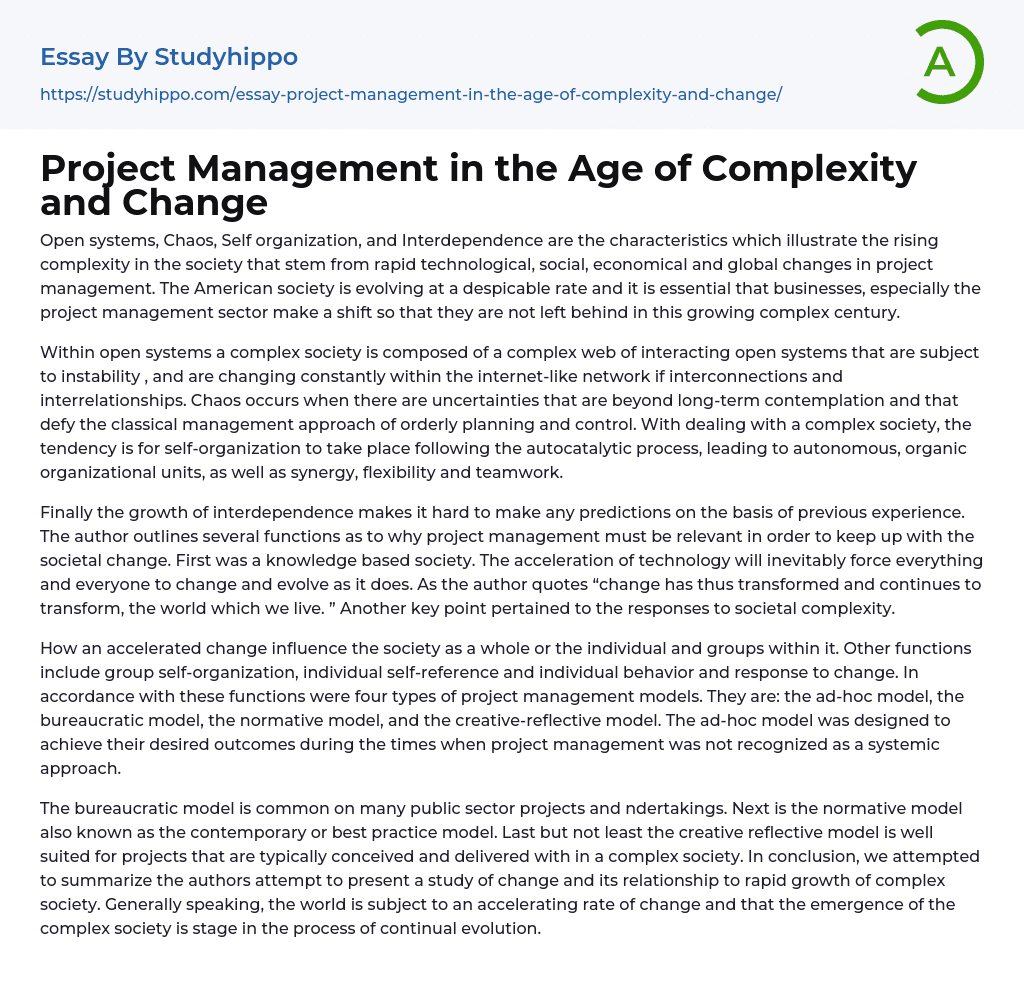

Project Management in the Age of Complexity and Change Essay Example
The increasing complexity in society, demonstrated through open systems, chaos, self-organization, and interdependence, is a result of swift changes in technology, social structures, economics, and global affairs in project management. The pace at which the American society is progressing is alarming; hence it is crucial for enterprises, particularly those in the project management field, to adapt to avoid being left behind in this increasingly intricate era.
Open systems are part of a complex society that comprises an intricate network of interactive subsystems that are not entirely stable and are continually evolving within an interconnected web akin to the internet. When uncertainties become too unpredictable for long-term planning, chaos can ensue, challenging traditional management strategies of structured planning and control. In dealing with such complex societies, the instinct is for self-regulation to occur following an autocatalytic pro
...cess. This leads to independent, organic parts of the organization and promotes synergy, adaptability and collaboration.
Ultimately, the increasing interdependence hinders the ability to foresee things based on prior knowledge. The writer illustrates various reasons why project management needs to retain its relevance to cope with societal shifts. The primary reason given was the emergence of a knowledge-driven society. The rapid advancement in technology compels all aspects and individuals to adapt and evolve parallel to it. The writer iterates that "change has and continues to alter the world we reside in". An additional crucial aspect was related to dealing with societal intricacy.
The rapid pace of change has a profound impact on society as a whole as well as on individuals and groups within it. Other roles encompass processes such as group self-structuring, individual introspection, and individual reaction and adaptation to change. Thes
roles were reflected in four distinct project management models: the ad-hoc model, the bureaucratic model, the normative model, and the creative-reflective model. The ad-hoc model was built to realize its intended outcomes during periods when project management was not acknowledged as a systematic method.
Many public sector projects and undertakings regularly utilise the bureaucratic model. Subsequently, the normative model, also referred to as the contemporary or best practice model, is also prevalent. Furthermore, the creative reflective model is particularly applicable to projects conceived and implemented within a complex societal context. In summary, we have endeavored to encapsulate the author's efforts to illustrate a study surrounding change and its correlation to the swift expansion of complex societies. Broadly, the world is experiencing an escalating velocity of change, signifying that the emergence of a complex society is an integral step in ongoing evolution.
- Culture essays
- Social Control essays
- Citizenship essays
- Social Justice essays
- Caste System essays
- Social Responsibility essays
- Socialization essays
- Deviance essays
- Modern Society essays
- Popularity essays
- Civil Society essays
- Community essays
- Female essays
- Filipino People essays
- Igbo People essays
- Indigenous Australians essays
- Indigenous Peoples essays
- Minority Group essays
- Social Institution essays
- Men essays
- The nation essays
- Middle Class essays
- Social Norms essays
- Discourse Community essays
- Popular Culture essays
- Car Culture essays
- American Culture essays
- Mormon essays
- Indian Culture essays
- Mexican Culture essays
- Pop Culture essays
- Cultural Differences essays
- Culture Shock essays
- Different Cultures essays
- Adaptation essays
- Adventure essays
- Adversity essays
- Aging essays
- Alcohol essays
- Barbie Doll essays
- Beauty essays
- Care essays
- Carpe diem essays
- Change essays
- Chess essays
- Chicken essays
- Choices essays
- Contrast essays
- Crops essays
- Development essays



